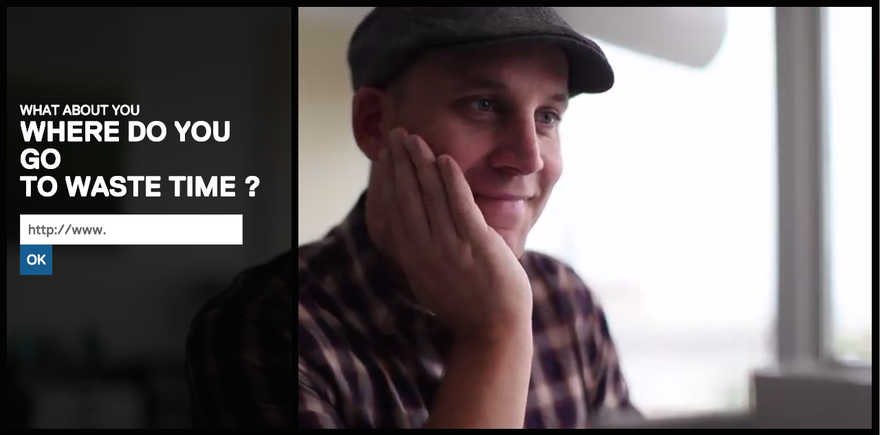Immediately upon clicking the ‘Play’ button, Do Not Track let’s me it knows where I live and that it’s a nice day outside. Hunched over my laptop in my office chair, my body straightens, an unbidden eye glancing out the window. Creator of this seven-part web documentary on data mining, Brett Gaylor, narrates the invasion of your privacy throughout—very effectively making you grateful for the fact that, at the very least, advertising companies don’t do voice-overs while mercilessly tracking your every online movement.
“The hope is that the audience realizes that they are implicated in this discussion,” Brett says about the personalization of the documentary. “That this is not abstract—it’s about you.”

For Brett, online web practices have always been tangible and personal, because it’s what his career revolved around. After working at the Mozilla Foundation, a non-profit which provides the Firefox browser service, he witnessed the pervasiveness of internet privacy issues first-hand. “The Mozilla Foundation was probably the largest group of Internet do-gooders you can imagine,” Brett says. “My job was running a program around web literacy, making sure that everyone had the ability to create the web and not consume it. Yet even this group relied heavily on revenues from Google, whose revenues were overwhelmingly drawn from advertising that relied on collecting data from users.”
During his time at Mozilla, the Snowden controversy hit critical mass, uncovering how the NSA used these same exact structures to execute mass surveillance over the entire planet. “As someone who’d spent an entire career encouraging people to use the Internet, I started thinking it was time to take a critical look at where the Internet was headed.”
In the first two episodes of Do Not Track, viewers input some quick information about their online habits, like the sites they frequent most for entertainment and news. In the process, Do Not Track reveals the personalized web of digital spying you are caught in everyday with little to no consideration. To an extent, the offhanded way the documentary collects this information from you is in itself a satirization of our unconscious sharing practices. It’s a mirror, a reflection of our willingness to participate—no questions asked—in something of far-reaching implications that we neither understand nor control.
“We wanted to illustrate how your data is collected and used, and be transparent about this collection,” Brett explains. Of course, Do Not Track includes a privacy policy detailing what information they have and how they’re using it. “But I do hope the action causes people to ask more questions and be more critical the next time their data is collected—even if it’s from us.”

After revealing the meaning behind the word “cookies” and all those cutesy pop-up warnings with Cookie Monster on them, Do Not Track makes another salient point. Though the law may (sometimes) requires websites to tell you that they’re collecting more information on your habits than your own mother knows, nothing stops them from re-branding this dubious ethical practice with benign images that tell the viewer “Don’t think too much about it! Just look at this adorable Cookie Monster and click yes.” Oddly, though you can consent to data-mining practices by clicking the “OK” button in these pop-up warnings, there is never a “DO NOT TRACK” option allowing you to refuse.
That’s because, in the system we’ve created to ensure the web stays “free,” we’ve also forfeited our right to choose. Possibly the single most chilling moment in the introductory episodes to Do Not Track is the distinction that the issue of data mining is not a personal one. It’s a societal one. Because when people become dehumanized masses of collected information, there are certain groups of people who invariably suffer more negative consequences than others. In our current system, this choice-less yet somehow still democratic “free” web doesn’t just take your information to create a personal profile. It uses your personal information as leverage, to be compared and contrasted with everyone elses.
the issue of data mining is not a personal one
“The fact that people often shrug off privacy concerns by saying ‘I don’t have anything to hide’ only highlights how tracking disproportionately affects minorities,” Brett explains. “If you are in a position of privilege, at worst you might be targeted for an advertisement. But what if you’re from a community that already experiences detrimental profiling?”
Brett gives the example of Staples. The Wall Street Journal discovered that Staples actually alters their online prices for products depending on where the user is accessing the website from. To incentivize target customers, Staples will offer you a better price based on your proximity to the nearest store. “But doesn’t that discriminate against people in lower income areas, who don’t live near or have access to certain services and amenities?” What this mass data collection effectively does is force people in lower-income areas to pay more money to send their kids off to school or to start a new project or job than those living in affluent neighborhoods.

When consumers become little more than a massive pile of perpetually renewed information, businesses are almost encouraged to discriminate without a second thought to the larger implications. For more resources and information on how surveillance on the web perpetuates discrimination (and how it can be prevented), please be sure to check out this overview by Alicia Garza, a founder of the Black Lives Matter movement which aims to address these online power struggles.
While, at times Do Not Track can come across as one-noted (“data mining is bad”), Brett says that the goal of the documentary isn’t just to hammer a single point into viewers. “My goal is to incite curiosity,” he says. “We’re just at the beginning of a societal discussion about privacy in a digital world, so I want as many people as possible caring and thinking about this issue.”
you are implicated in this discussion, whether you want to be or not
Part of the web documentary’s power lies in teaching viewers the history behind how data-mining practices came to be. So often we accept the current state of online advertising practices as an unchangeable status quo. But after watching an interview with Ethan Zuckerman, the notorious (and apologetic) inventor of the pop-up ad, Do Not Track reveals just how arbitrarily we ended up here. Back then, if more people had been around to consider the best possible route for monetizing the internet, we probably wouldn’t be where we are today. And, really, we don’t have to be where we are today.
“I hope that people who experience Do Not Track realize that they are implicated in this discussion, whether they want to be or not. And that they can influence it,” Brett says. Because if there’s one thing the internet’s constantly shifting format should excel at, it’s inspiring change.
You can watch the first two episodes of Do Not Track now on your web browser, and expect the rest of the episodes to release throughout the following few months.
